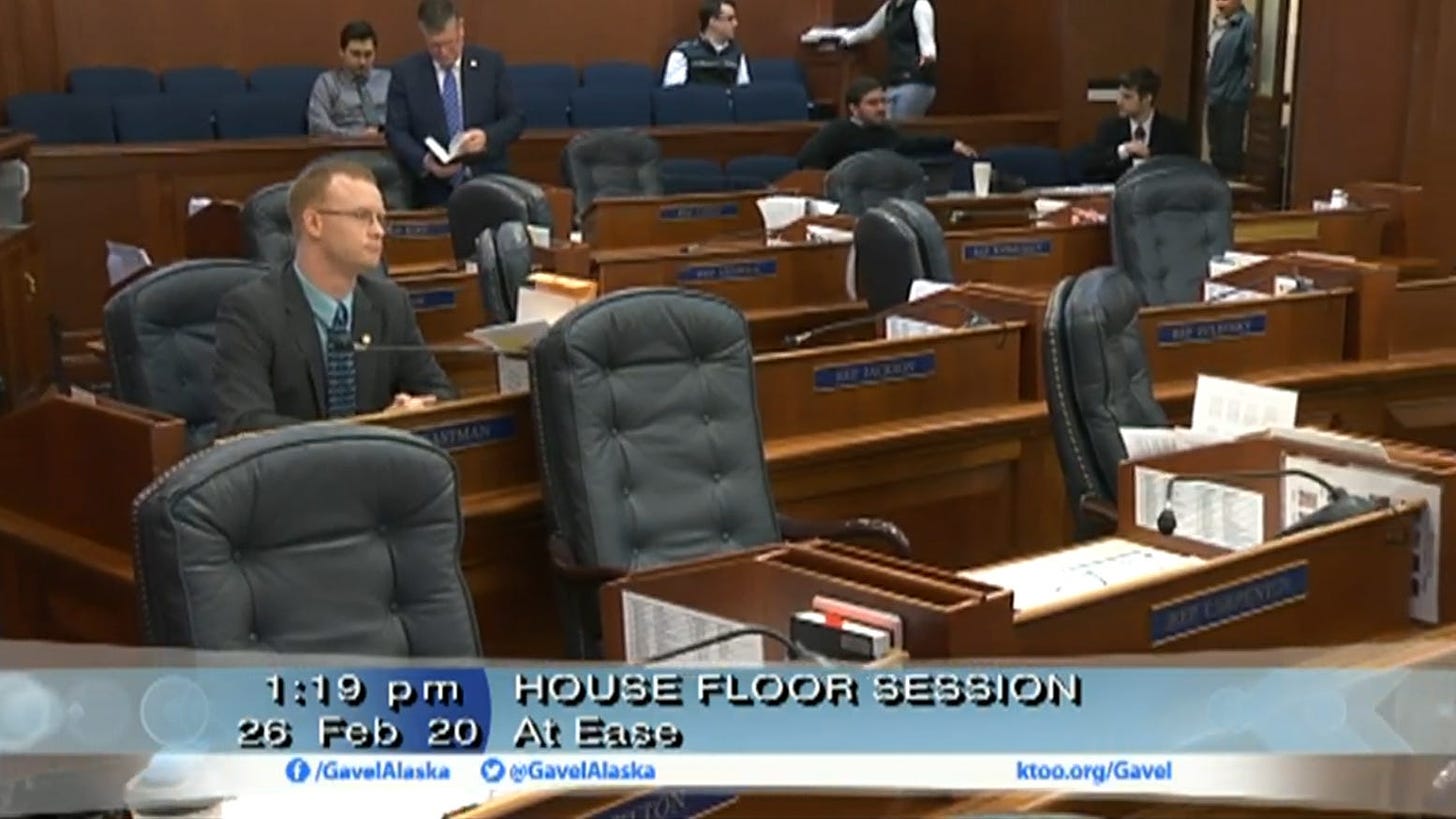The silver linings election
The national election was a bummer but Alaska has a lot to look forward to after voters elected a majority of bipartisan-minded legislators.
It’s Thursday, Alaska! We’ll get through this.
Current mood: 😵💫
The silver linings election

Welp. That didn’t go as I was expecting.
But as I’ve done several times in the moments and days following stinging elections, I’m reminded that the most impactful politics happen on our state and local levels. On that front, Tuesday’s election brought a big silver lining: resounding victories for Alaska’s bipartisan-minded legislative candidates.
Though there are still many ballots to be tallied, a coalition of Democrats, independents and moderate Republicans will flip Alaska’s Republican-led House and maintain the bipartisan majority in the Senate. It’s the first time in my time covering the Alaska Legislature that bipartisan coalitions will control both chambers (though, if we’re being fair, several Republican-led majorities have technically been bipartisan with their reliance on rural legislators, but you know what I mean).
The newly minted bipartisan majorities will importantly take the committee gavels out of the hands of far-right legislators, who had used them to advance divisive culture-war-type issues in the recent session. It will also likely hamper much of the worst impulses of Republican Gov. Mike Dunleavy, who has proved incapable of working with legislators who aren’t already in lockstep with him. That said, Dunleavy’s time in Alaska may also be cut short given all the talk that he may join the Trump administration. Silver linings.
In the House, the bipartisan coalition will net three seats. Four seats are set to flip out of the hands of conservative, party-loyalist Republicans, while just one flip will occur in the other direction.
In South Anchorage, independent Ky Holland has a six-percentage-point lead over Republican Lucy Bauer (53.08-46.68) in a race to fill an open seat held by Republican Rep. Laddie Shaw, who declined to seek re-election.
In West Anchorage, moderate Republican Chuck Kopp—a former representative—repeated his primary election trouncing of GOP Rep. Craig Johnson, beating the once-powerful Rules Chair by a whopping 23 percentage points (60.91-37.91).
In East Anchorage, the second time was the charm for Democrat Ted Escheid in his race against Republican Rep. Stanley Wright. Escheid, who lost narrowly to Wright in 2022, now holds a roughly 3-point lead (51.28-48.46).
On the North Slope’s House District 40, Democrat Robyn Burke holds a commanding lead over Republican-turned-independent Rep. Thomas Baker. With 15 of 20 precincts reporting as of Wednesday afternoon, Burke has 56% of the vote in the three-way race for the seat. Baker and Democrat Saima Chase each have about 21% of the vote. Baker was appointed by Republican Gov. Mike Dunleavy and has been a reliable ally, frequently splitting with other rural legislators on issues like education funding and election reform.
The lone flip in the other direction—barring any last-minute flips (I’d be watching Anchorage’s House District 18, where Democratic Rep. Cliff Groh has a 28-vote lead over Republican David Nelson, and the Peninsula’s House District 6, where extreme-right Rep. Sarah Vance could be vulnerable depending on how ranked-choice voting plays out)—is down in Southeast Alaska, where Republican Jeremy Bynum holds an outright majority in the race to fill the open seat held by retiring independent Rep. Dan Ortiz. With 51.5% of the vote, Bynum won’t have to sweat the potential consolidation between independent candidates Agnes Moran and Grant Echohawk, who received about 24.5% and 23.7% of the vote, respectively.
That said, those bipartisan-minded legislators have seen enough to have already laid claim to the House Majority.
On Wednesday afternoon, the newly minted majority announced Dillingham independent Rep. Bryce Edgmon will be its next Speaker, returning to the role he held for two sessions. Kodiak Republican Rep. Louise Stutes will round out his leadership team as Rules Chair, and Rep. Kopp will be Majority Leader.
“Alaskans have spoken clearly, and we will work together, representing residents of all regions, to stabilize public education funding, develop affordable energy, and fix Alaska’s workforce crisis,” said Rep. Edgmon in a prepared statement.
The coalition laid out four legislative priorities for the upcoming session: Balanced budgets that stay within the spending limits laid out in state law, stable education funding with a goal of reduced class sizes and improved outcomes, retirement reform for public employees and energy development.
The worker-focused policies also coincide with the passage of Ballot Measure 1, which will raise the minimum wage to $15 per hour and guarantee paid sick leave for most workers.
The Senate Bipartisan Majority lives on
The Senate’s 17-member bipartisan majority made it through the election largely unscathed despite heavy Republican spending to unseat a trio of senators seen as the most vulnerable.
The results show Fairbanks Democratic Sen. Scott Kawasaki and moderate Republican Sens. Kelly Merrick of Eagle River and Jesse Bjorkman of Nikiski have leads over their opponents. Kawasaki has an outright lead over Republican candidate Leslie Hajdukovich, who was pitched at the GOP’s latest best shot at unseating the Democrat, with 50.27% to 49.48%. Merrick and Bjorkman faced similar races with far-right challengers and Democrats with suspicious ties to the far-right. In both cases, they are a few percentage points of an outright majority but I’d expect them to close it out with ranked-choice voting.
Partyline Republicans had to make inroads in those races if they hoped to crack the core of the Senate’s bipartisan majority.
Without that, the next Senate is set to look a lot like the current one.
Senate President is set to be Kodiak Republican Sen. Gary Stevens, who will hold an unprecedented fourth term in the role. Anchorage Republican Sen. Cathy Giessel and Anchorage Democratic Sen. Bill Wielechowski will round out the leadership team, reprising their roles as majority leader and rules chair. The powerful Senate Finance Committee will also be a rerun with Sens. Bert Stedman (R-Sitka), Lyman Hoffman (D-Bethel) and Donny Olson (D-Golovin) helming the committee.
Further positions and membership in both majorities will be announced once more votes are counted, and internal organizational meetings are held.
One last thing
Extreme-right Wasilla Republican Rep. David Eastman is currently lagging far-right Republican Jubilee Underwood, 47.7-51. Eastman, a dependable voice of racist and inflammatory comments, has long been a thorn in the side of Republicans, in large part because he has refused to play nice with other conservatives. Heading into the 2022 election, he faced an effort to disqualify him for being an anti-government Oath Keepers group member and attending January 6, but the judge stopped short of barring him from running for office. He was not part of the House Majority this past session and ultimately lost his one committee seat.
Underwood, meanwhile, played a key role in book bannings as the president of the Mat-Su School Board.
Stay tuned!




